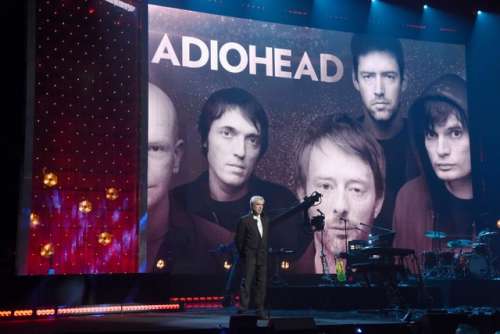David Byrne Inducts Radiohead Into The Rock & Roll Hall Of Fame

CREDIT: Dimitrios Kambouris/Getty Images For The Rock and Roll Hall of Fame
By Chris DeVille
One of the most basic bits of Radiohead trivia is this: They named themselves after a Talking Heads song. Actually, they were called On A Friday first because they practiced on Fridays, but that’s another story entirely. At some point they correctly decided “Radio Head,” from the 1986 film and album True Stories, was a much better moniker. As such, the legacy of David Byrne and company has followed them throughout their entire career, at least among those wise to the origin of their band name. So it’s appropriate that Byrne, himself a member of the Rock & Roll Hall Of Fame along with his fellow Heads, would be the one to induct Radiohead into the hall.
At tonight’s induction in Brooklyn’s Barclays Center, Byrne gave the ceremonial speech honoring Radiohead. Only guitarist Ed O’Brien and drummer Philip Selway were present — frontman Thom Yorke claims he’s busy with commitments surrounding the performance of his piano compositions with the Paris Philharmonic, a performance that’s happening nine days from now — but that didn’t stop Byrne, ever the warmly encouraging presence, from saying nice things about Yorke and his bandmates (some of whom have also gone on record about their ambivalence toward this institution).
Here’s the transcription of Byrne’s indiction speech (via Rolling Stone):
I was surprised and very flattered when Radiohead stated that, yes, they named themselves after a song I’d written. But had to ask myself, “Why that song? That slightly goofy Tex-Mex song? Why that one?” We’ll never know.
Thankfully, I’m a huge fan of the group. They richly deserve this honor for two reasons: their music, the quality and constant innovation, but equally for their innovations in how they release their work — that has affected the entire music business, and there’s quite a few people in the music business in this room tonight. They’re creative and smart in both areas, a rare and inspiring combination.
Here’s a tidbit: Radio 1 in the UK refused to play their song “Creep” because they found it too depressing. But then it started getting played elsewhere all over the world, and, well, the rest…
And another: Capitol Records felt that what many consider to be their masterpiece, OK Computer, was career suicide and adjusted their release and marketing plan accordingly. It eventually went to Number 1 in the UK. “Paranoid Android,” from that album, was considered the new “Bohemian Rhapsody,” whatever that means. I’m looking forward to seeing the movie, and seeing who will play Thom.
For me, their record after that, Kid A, was my conversion moment. The record joined together electronics with song forms blew me away. I’d never heard anything like it. There are elements and influences of Can and Miles Davis’s electric period, but this was very different.
What was really weird and very encouraging was that it was popular. It was a hit! It proved to me that the artistic risk paid off and music fans sometimes are not stupid. Some of that will be attested to by those in the music industry in the room tonight. As experimental as it was, it went to Number 1 in the US. Business-wise, they were already innovating. This was in the year 2000, with an app that you could stream music on and access things.
Now a few records later, with In Rainbows, the music that at one point sounded radical and on the edge now felt completely natural. And at that point they took the radical leap of selling the record for the price of “pay what you wish.” You could pay zero or one cent. You could pay the price that records were going for that year. It turned out most people did pay the going rate, and some people actually paid more. Which was, I thought, an incredible thing. They showed trust in the audience, trust in the public. They trusted them to place value in the music and say: You tell us what you think it’s worth. And the audience responded and said: We think it’s worth something. This was a wonderful social experiment, not just an experiment in the music business.
Further release innovations: They released the rejected Bond theme “Spectre,” which was never used, on SoundCloud. And musically, they keep changing. Their last record, Moon-Shaped Pool, sounded very cinematic, sounded like a movie in your head. They’ve both changed our idea of what popular music can be and how it can be released and marketed to us. For those things, I am honored to induct Radiohead into the Rock and Roll Hall of Fame.